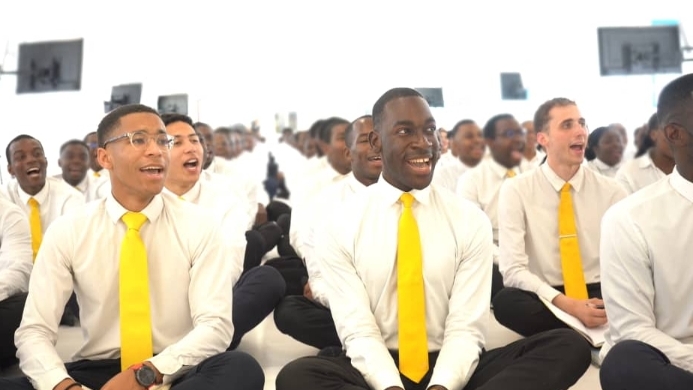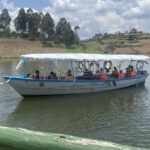Only Speculative Remarks from Former Members Quoted to Generalize Entire Church… “Only Two Lines Dedicated to the Church’s Sincere Response”
“Fair Reporting Practices Needed to Uphold Religious Freedom and Protect Believers”
On April 9, the Shincheonji Church of Jesus in France issued an official statement criticizing the French daily newspaper Le Parisien for its April 7 article. The church alleged that the report portrayed them in a distorted manner, stating that “the honor of the church and its members has been severely damaged.”
The church pointed out that the article heavily emphasized one-sided claims from former members while scarcely reflecting the actual nature of the faith community, thus presenting a biased view. Despite providing sincere answers during the interview, the church noted that their position was reduced to just two lines in the article.
The statement emphasized the need for fair media practices and accurate reporting standards to uphold religious freedom and protect the rights of believers.
The controversial article, titled “They Treated Us Like Animals,” labeled the Shincheonji Church of Jesus as one of the “problematic evangelical groups” in France. It was based on the testimony of an anonymous former member, who made claims about training camps, isolation from personal relationships, and monetary demands. The church emphasized that their position was represented in only two sentences.
A church representative stated:
“We sincerely submitted a detailed written response, amounting to several thousand characters, addressing the 12 questions the journalist had sent in advance. Yet, only two sentences from our response were included in the article.”
The representative continued:
“That accounts for less than 1% of our full response, severely limiting readers’ ability to gain a balanced perspective.”
The church also questioned the integrity of the article, noting it was published just four hours after they submitted their answers—suggesting that the article may have been pre-written with a targeted narrative. They added:
“If written responses were not enough, the journalist could have visited the church in person to observe the faith community and hear directly from current members. The church is always open and ready for transparent communication with the media.”
To reflect the real experiences of its members, the church shared testimonies from current believers:
Teresa (29), attending the Paris congregation for six years, said:
“Faith is something you do voluntarily. Through this church, I came to truly understand God and learned how to act as a light in the world as one of His people.”
Axel (30) shared:
“Before coming to the Shincheonji Church, I was searching for meaning in my life. Through my faith here, I came to understand what God truly wants, and doing God’s work brings me great joy. I even met my wife here and have been able to travel while fulfilling my mission. I’m living a truly fulfilling life.”
Regarding the article’s headline, “They Treated Us Like Animals,” the church responded:
“That expression deeply shocked and confused our members. No one has ever been treated in such a way. It was clearly used as a sensational headline to attract attention.”
The church firmly rejected any form of coercion or stigmatization against those who leave, stating:
“There is a culture of respecting personal choice, even after someone decides to leave.”
Addressing the claim that a woman broke up with her boyfriend at the church’s request, the church explained:
“This is not true. The man was also a believer interested in marriage. The woman expressed that she wasn’t ready for marriage, and the breakup was a personal decision based on their own discussions and reflections—not due to any pressure from the church.”
The church further stated:
“Romantic relationships and marriage are personal matters based on individual autonomy and responsibility. Linking these decisions to church control is simply not factual.”
They also raised concerns about parts of the article that described events the interviewee had not experienced. For example, a photo of someone with their feet on a radiator was described as “punishment,” but the church clarified:
“This image was taken before the interviewee joined the church. The person in the photo is still an active member. It was meant as a joke and used without consent. The context was misrepresented, and the person plans to file a formal complaint with the media outlet.”
Regarding the so-called “training camp,” the church clarified:
“This was a short-term voluntary program for mission workers, involving morning prayer and Bible meditation. Participants could leave at any time. Recognizing potential misunderstandings, the church has since discontinued it.”
In response to allegations about personal data collection, restricted internet use, and severing family ties, the church stated:
“These claims are completely false. Only the minimum necessary information for faith counseling is collected. There has never been any restriction on internet use or external relationships. On the contrary, members are encouraged to live exemplary lives within their families and communities.”
Explaining the use of the name “ECA Academy,” the church said:
“This was a temporary name for a Bible education program in 2019. At the start, it was clearly stated that it was affiliated with the Shincheonji Church of Jesus, and joining the church afterward was entirely up to the individual.”
In light of the recent media coverage, the Shincheonji Church of Jesus in France urged the press to follow these principles:
Inclusive reporting that reflects a range of perspectives and experiences
Fair representation of the church’s official statements and responses
Opportunities for current members to share their genuine experiences
A journalistic culture that respects religious freedom and the dignity of believers
Avoidance of prejudiced framing through sensational headlines or expressions
A church representative concluded:
“Biased reporting on a specific religion can lead to stigmatization and prejudice against innocent members, infringing on their religious freedom and human rights. The media must move away from sensational, hate-inducing narratives and instead strive for balanced reporting that embraces diverse voices with mutual respect.”
“We hope Le Parisien, along with all media outlets, will uphold ethical standards and fairness in religious reporting. The Shincheonji Church will continue to promote better understanding through transparent communication and open dialogue.”























